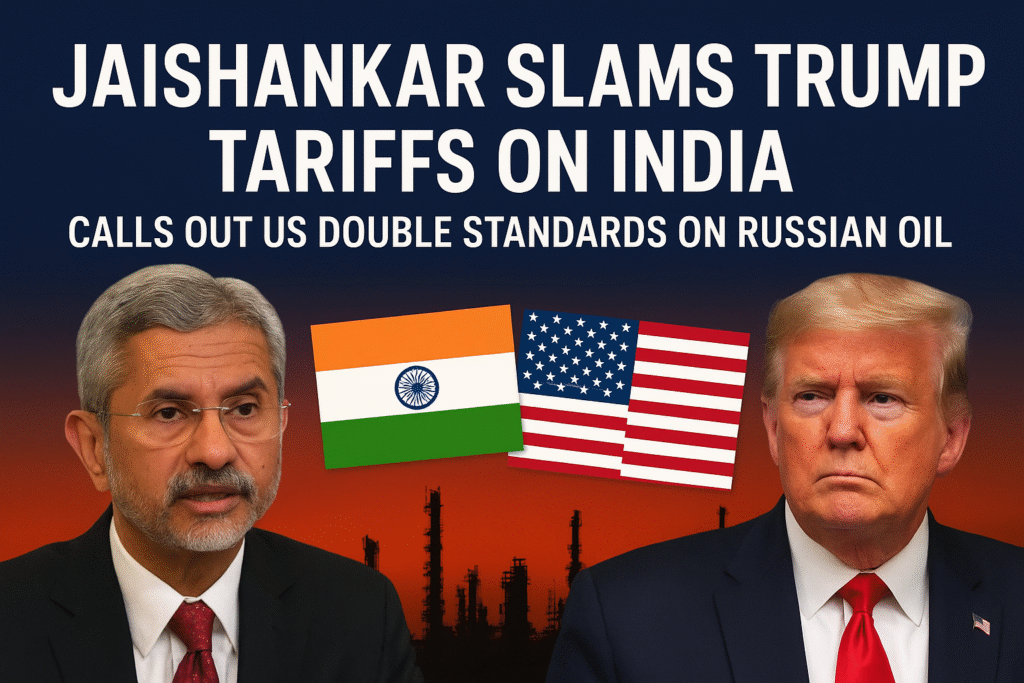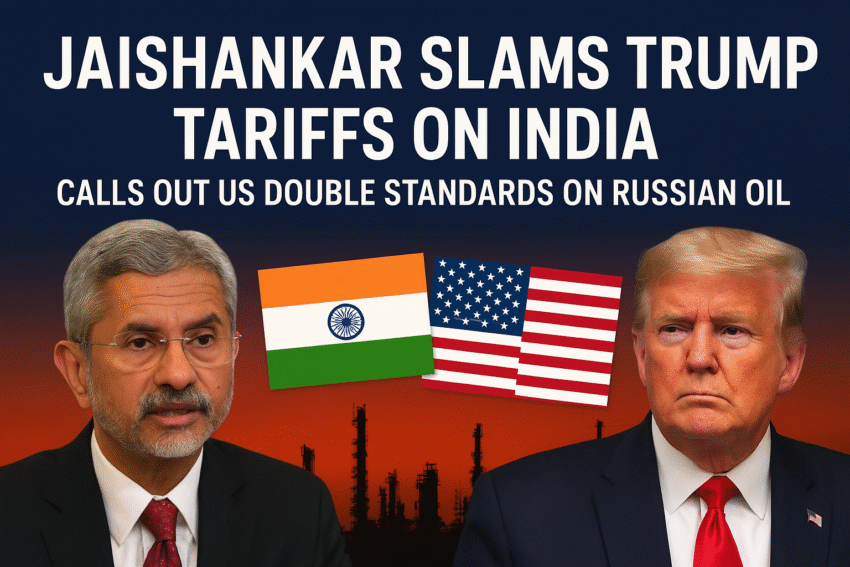
Jaishankar Slams Trump Tariffs on India: Calls Out US Double Standards on Russian Oil
India’s External Affairs Minister S. Jaishankar has delivered a sharp critique of the recently imposed Trump tariffs on India, calling Washington’s logic “very perplexing” and inconsistent. At a press briefing in New Delhi, Jaishankar pointed out the contradiction in U.S. policy—reminding that not long ago, it was Washington itself that urged India to increase purchases of Russian oil.
The new Trump tariffs on India, announced earlier this week, impose additional duties on a wide range of Indian exports, including textiles, auto parts, and pharmaceuticals. The move has sparked tensions between New Delhi and Washington, raising concerns about a fresh round of trade disputes between the two democracies.
Jaishankar: ‘Logic of Trump tariffs on India very perplexing’
Speaking on the issue, Jaishankar said:
“We find the logic behind these Trump tariffs on India very perplexing. Not long ago, the U.S. encouraged India to purchase more Russian oil, even offering mechanisms for payment. Today, we are being penalized under the pretext of such purchases. The inconsistency is striking.”
This direct rebuttal has gained wide attention, as it highlights how Trump’s tariffs on India may be driven more by political rhetoric than by trade concerns.
The Russian oil connection
Jaishankar reminded reporters that after the Russia-Ukraine conflict began, global oil prices soared, putting immense pressure on developing economies. India, which imports nearly 85% of its crude oil, was encouraged by several Western nations—including the U.S.—to explore options with Russia to stabilize prices.
“We did what was necessary to ensure energy security for our people. The same nations who pushed us toward Russian oil are now turning around and citing it as grounds for Trump tariffs on India. This double standard cannot be ignored,” Jaishankar added.
This reference to Trump tariffs on India directly connects to the global energy crisis and the geopolitical struggle around Russia.
Experts weigh in on Trump tariffs on India
Economic experts believe the Trump tariffs on India could be part of a larger protectionist strategy aimed at boosting U.S. manufacturing ahead of the elections. However, many analysts argue that the tariffs are unlikely to help the U.S. economy but will instead disrupt long-standing trade ties with India.
Former ambassador Kanwal Sibal noted, “The Trump tariffs on India are a political maneuver. India is being targeted at a sensitive time when global supply chains are already under stress.”
India’s possible response
While Jaishankar has taken a firm diplomatic stand, New Delhi is also considering trade countermeasures. Indian industry bodies have urged the government to explore reciprocal tariffs and to strengthen alternative trade partnerships with the EU, ASEAN, and BRICS nations.
Analysts believe that retaliatory measures may escalate tensions, but India’s reliance on U.S. markets for IT services and pharmaceuticals could limit the extent of retaliation.
Still, Jaishankar’s sharp words signal that India will not quietly accept Trump tariffs on India without pushing back.
A pattern of Trump’s trade wars
This is not the first time India has faced trade challenges under Donald Trump. During his previous term, the U.S. withdrew India from the Generalized System of Preferences (GSP), stripping duty-free access to billions of dollars’ worth of Indian exports. The latest Trump tariffs on India appear to continue this pattern of aggressive trade measures.
Conclusion: India will push back against Trump tariffs
The controversy over Trump tariffs on India underscores the growing complexities in U.S.-India relations. While both nations share strategic interests in security and defense cooperation, trade disputes remain a recurring challenge.
Jaishankar’s reminder that it was the U.S. which once urged India to buy Russian oil has exposed Washington’s shifting narrative and double standards. The coming months will reveal whether diplomacy can resolve the dispute—or if Trump tariffs on India will escalate into a full-blown trade conflict.

